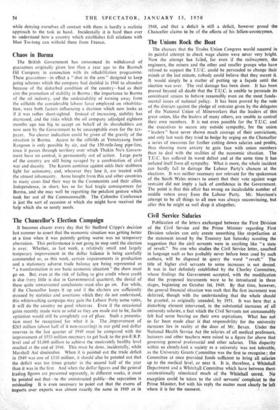The Unions Rock the Boat
The chances that the Trades Union Congress would succeed in its painful attempt to check wage claims were never very bright. Now the attempt has failed, for even if the railwaymen, the engineers, the miners and the other and smaller groups who have refused to support the T.U.C. could be persuaded to change their minds at the last minute, nobody could believe that they meant it. It would simply be a matter of putting up a facade until the election was over. The real damage has been done. It has -been proved beyond all doubt that the T.U.C. is unable to -persuade its constituent unions to behave reasonably even on the most funda- mental issues of national policy. It has been proved by the vote of the districts against the pledge of restraint given by the delegates of the National Union of Mineworkers that the leaders of this great union, like the leaders of many others, are unable to control their own members. It is not even possible for the T.U.C. and the executives to secure any outside sympathy, for the union
" leaders " have never shown much courage of their convictions, and only last week they tried to hedge by urging on the Chancellor a series of measures for further cutting down salaries and profits, thus showing more anxiety to gain face with union members than to deal with the realities of the economic situatio,n. The T.U.C. has suffered its worst defeat and at the same time it has isolated itself from all sympathy. What is more, the whole incident can hardly fail to damage the Labour Party's chances at the elections. It was neither necessary nor relevant for the spokesman of the South Wales miners to assert that their vote against wage restraint did not imply a lack of confidence in the Government.
The point is that this affair has swung an incalculable number of middle voters away from the Labour Party. Mr. Morrison's attempt to be all things to all men was always unconvincing, but after this he might as well drop it altogether.






























 Previous page
Previous page